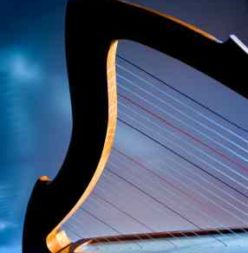 This is a collection of performance tips for Celtic harpists, and it includes all the things that have helped me on my journey as a performer. As your skill and confidence with the Celtic harp increase, you will no doubt have more and more opportunities to share your music. I hope these tips will help you make each performance experience a joyful one for both you and your audience!
This is a collection of performance tips for Celtic harpists, and it includes all the things that have helped me on my journey as a performer. As your skill and confidence with the Celtic harp increase, you will no doubt have more and more opportunities to share your music. I hope these tips will help you make each performance experience a joyful one for both you and your audience!
Musical Readiness
It goes without saying, perhaps, that unless you’re a seasoned professional who can sight read in public, you’ll want to know your music very well. Always choose the “old favorite” piece over the flashier piece that’s “almost” ready.
Use every kind of learning style to really own your music: visual, auditory, analytical and kinesthetic memory:
~ Study the score away from the harp, looking for patterns, and pay attention to hand forms you’re using on the harp
~ Listen to recordings of the piece often, and be able to sing the melody and any counter melodies without the music
~ Know the chord progressions, how one pattern connects to the next, and the structure of the piece.
Your kinesthetic sense is usually well-developed by the time you perform, but you cannot rely on muscle-memory alone when your nerves kick in. Above all, record yourself, with video if possible. There is no better way to gauge your progress, and the recording itself will simulate performing every time you do it.
Physical Readiness
Before you perform, get plenty of rest, exercise, and good food. Self-care is more critical now than ever.
Try eating a banana (really!) or using the Bach flower remedy known as Rescue Remedy. Add a few drops of it to your bottle of water, and sip it frequently.
If your hands shake, focus your attention on where and how much in the present moment they are shaking. This is the opposite of the impulse to resist, which only makes the shaking (or any other physical symptom of stage fright) worse. Remember, “What you resist, persists.”
If None of these things keep your adrenalin levels and physical symptoms in check, you might consider talking to your doctor about beta blockers. For some performers, these medications make the difference between being able to perform or not.
Psychological Readiness
Use positive language to frame your experience: instead of saying “I’m nervous’, say ‘I’m excited about performing.’ Instead of talking about having ‘stage fright’, speak of your growing ‘anticipation’. Remember that this is an experience you’re choosing; don’t push it away.
Love your music, and love each person in the audience that you want to share it with. Think about ‘sharing” rather than ‘performing.’
Sing as you play, out loud or in your head. Never forget that it’s a song you’re playing, a melody or a tapestry of sound that you know and love.
Record yourself. Keep rolling the recorder until you get the performance that makes your heart sing. Perform as often as you can. The more often you play for people, the more natural it becomes. Keep stretching your comfort zone with slightly bigger challenges in performing. It’s about growth, not perfection.
Realize that you are in the perfect place right now, and that you play as no one else does. Stop thinking about what you don’t know yet and celebrate that fact that you play the harp. Make each note like a caress, a demonstration of the joy that playing the harp brings you. The simplest song, played with love, can do this as well or better than the flashiest harp solo out there.
What about mistakes?
Be prepared. Use every memorizing strategy you can find, and be able to jump to the next important spot in your piece. This means you understand the structure of what you’re playing: where the sections are, where the phrases are, which patterns repeat and where they change. (And once you know those things, your piece will be almost memorized).
However, you will make mistakes. Even the stars of the harp world do. Forgive yourself, and move on. Remember, live performance is alive because of the connection between you and the audience. You can’t get that from our artificially perfect recording industry.
Practice getting back on track after making mistakes. If you’ve used every kind of memory (see Tip #1), you will be able to find your way out of any false turn. Practice playing the next passage with such finesse, such flourish, that anyone who noticed the mistake starts to question whether they really heard it. Watch people who do this, and copy them (my own teacher is amazing at this skill).
Above all, remember to focus on what comes now and what comes next, not what just happened. Stay in the present, in the flow.
The Harp Effect
Finally, no collection of performance tips for Celtic harpists would be complete without the most important tip of all!
Always remember the ‘harp effect’. Most people are so surprised to hear a harp, and so transported by the lovely sound, that they don’t even hear the mistakes. Don’t ruin their experience by drawing attention to your mistakes, now or when you’re done playing. Instead, be prepared to answer all their questions about this beautiful and amazing instrument.

